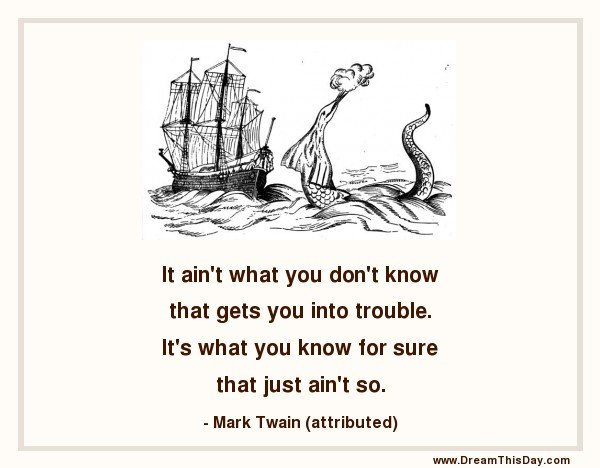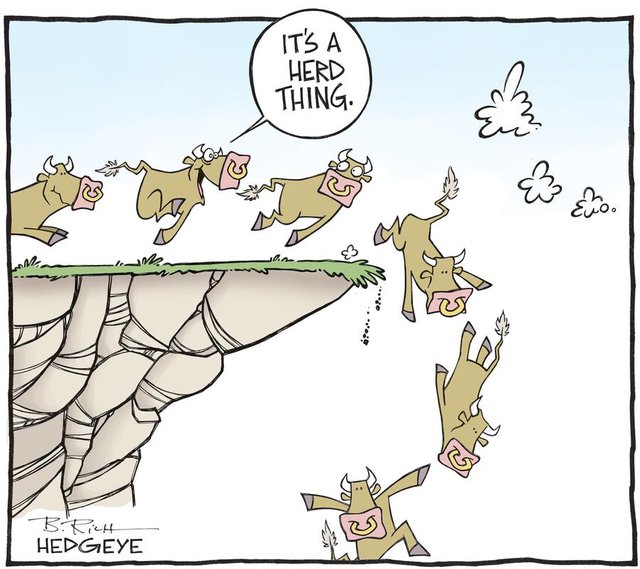What Is Risk?
Many like to revel in the notion of risk being an objective measure. A measure easily defined by models, predictive analysis, artificial intelligence, and big data – all new age constructs for the formerly revered, and now maligned, figure of the expert.
In today's terms, risk has almost exclusively been defined using VAR.
And the way today's financiers look to remove risk from their vocabulary is via the risk parity portfolio .
Of course, there are the real-life, literal meanings to risk, such as driving way beyond the speed limit on a curvy road without a guardrail, standing too close to the edge of a cliff, diving headfirst into shallow waters, or arming angry, young men with weapons and shipping them to foreign lands.
What I will be referring to herein is the risk we take with our capital, the risk we take with our future via the decisions we make today.
These decisions can range from how we invest our money, how much we save, how much we spend, how much we keep in the banks, whether we take on debt, whether we pay down our debts, etc.
For the common man and woman, risk isn’t something heavily discussed. It’s much more likely to hear people talking about the effervescent and all-elusive reward. The reward is the apple of any eye, and when mentioning the reward you are much more likely to garner people’s attention. Look no further than any sort of investment newsletter promotional to see this trend in action, or more evidently, in the growth of your local lottery's revenue.
Risk is not as sexy a topic as reward, and that’s perfectly fine because as I’ve said before, investment and personal capital management is not a beauty contest.

I find it healthy to zoom out from your personal notion of risk. There is a very high chance that your thoughts on risk were shaped, in large part, by your family, your friends, your upbringing, and those around you (think along the lines of you being the sum of your 5 closest relationships).
If we are to assume that everyone’s risk parameters are defined loosely in this way, then it’s quite easy to understand how group think and herd mentality seeps itself into the definition of risk.

Generally, an analyst, financial professional, economist, or political figure will come to define an asset, a strategy, or a philosophy as risk-free. The term "risk-free" is another way to shout into a crowded room of people “free money!”
After all, that is what risk-free really means. You cannot lose money, as there is no risk.
Eventually this narrative spreads to a point where it becomes common knowledge that asset XYZ is risk-free. Everyone begins piling their money into this asset because it’s free yield -- free money baby!
Yet, just as this concentration of capital begins to reach unsustainable heights it’s well within your interests to question the sustainability of the capital inflows and the momentum of the narrative.
Just within the last several years, we have been through the following risk-free narratives:
And we are currently experiencing these risk-free narratives:
Risk is often the opposite of what you’re being told. At the least, your risk profile is much more attractive in the assets that others perceive to be risky, so long as this skewed risk perception coincides with cyclically/historically low valuations.
There is no one-size-fits all answer to risk management. The point remains, you can reduce your risk exposure by taking the path less travelled.
Question everything and come to your own conclusions. This is what do your own due diligence means. The markets reward you when you voice an opinion and it turns out to be fact.
"Never stand in line to buy anything. Patience is the highest yielding asset.” -- Jim Grant
DISCLAIMER : This content is for informational, educational and research purposes only. This post is not to be taken as personalized investment advice.